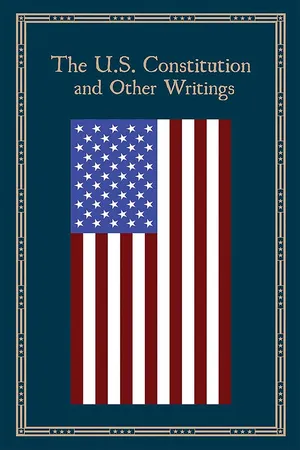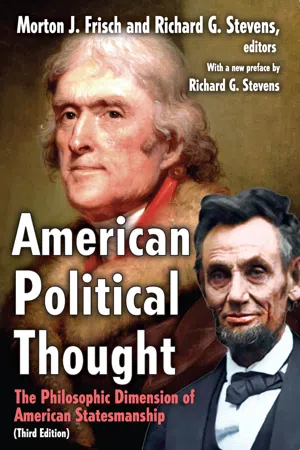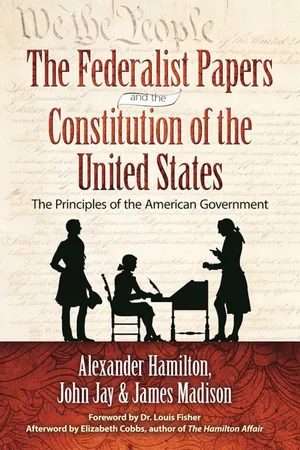Politics & International Relations
The Federalist Papers
"The Federalist Papers" is a collection of 85 essays written by Alexander Hamilton, James Madison, and John Jay to promote the ratification of the United States Constitution. The essays address the structure and function of the government, the need for a strong central authority, and the importance of checks and balances. They remain a significant source for understanding the intentions of the framers of the Constitution.
Written by Perlego with AI-assistance
Related key terms
3 Key excerpts on "The Federalist Papers"
- eBook - ePub
- (Author)
- 2017(Publication Date)
- Canterbury Classics(Publisher)
(1787–88)FEDERALIST NO. 1.GENERAL INTRODUCTION For the Independent Journal. Saturday, October 27, 1787 ALEXANDER HAMILTONTo encourage New York to ratify the U.S. Constitution, Founding Fathers Alexander Hamilton, James Madison, and John Jay wrote The Federalist Papers, eighty-five essays and articles that explained the need for a Constitution and discussed many other political issues. At the time, the essays were published anonymously under the pseudonym “Publius,” a popular Latin name in ancient Rome that also gave us the word “populous.” The Federalist Papers became the premier companion to the U.S. Constitution and are still used by federal courts today, including the U.S. Supreme Court, to interpret that document. Several of the most important papers are included here.T o the People of the State of New York:After an unequivocal experience of the inefficacy of the subsisting Federal Government, you are called upon to deliberate on a new Constitution for the United States of America. The subject speaks its own importance; comprehending in its consequences nothing less than the existence of the Union, the safety and welfare of the parts of which it is composed, the fate of an empire in many respects the most interesting in the world. It has been frequently remarked that it seems to have been reserved to the people of this country, by their conduct and example, to decide the important question, whether societies of men are really capable or not of establishing good government from reflection and choice, or whether they are forever destined to depend for their political constitutions on accident and force. If there be any truth in the remark, the crisis at which we are arrived may with propriety be regarded as the era in which that decision is to be made; and a wrong election of the part we shall act may, in this view, deserve to be considered as the general misfortune of mankind. - eBook - ePub
American Political Thought
The Philosophic Dimension of American Statesmanship
- Richard Stevens(Author)
- 2017(Publication Date)
- Routledge(Publisher)
i.e., insofar as we tend to be creatures of the society they founded. And in so freeing ourselves we may be enabled, if it is necessary, to go beyond their wisdom. The Founding Fathers still loom so large in our life that the contemporary political problem of liberty and justice for Americans could be stated as the need to choose whether to apply their wisdom, amend their wisdom, or reject it. Only an understanding of them will tell us how to choose.For the reflections on the Fathers which follow, I employ chiefly The Federalist as the clue to the political theory upon which rested the founding of the American Republic. That this would be inadequate for a systematic study of the Founding Fathers goes without saying. But it is the one book, “to which,” as Jefferson wrote in 1825, “appeal is habitually made by all, and rarely declined or denied by any as evidence of the general opinion of those who framed and of those who accepted the Constitution of the United States, on questions as to its genuine meaning.” As such it is the indispensable starting point for systematic study.I
Our major political problems today are problems of democracy; and, as much as anything else, the Federalist papers are a teaching about democracy. The conclusion of one of the most important of these papers states what is also the most important theme in the entire work: the necessity for “a republican remedy for the diseases most incident to republican government.”1 The theme is clearly repeated in a passage where Thomas Jefferson is praised for displaying equally “a fervent attachment to republican government and an enlightened view of the dangerous propensities against which it ought to be guarded.”2 The Federalist, thus, stresses its commitment to republican or popular government, but, of course, insists that this must be an enlightened commitment.But The Federalist - eBook - ePub
The Federalist Papers and the Constitution of the United States
The Principles of the American Government
- Alexander Hamilton, James Madison, John Jay(Authors)
- 2016(Publication Date)
- Racehorse(Publisher)
HE IMPORTANCE OF THE UNIONFEDERALIST PAPERS 1 – 14FEDERALIST No. 1GENERAL INTRODUCTIONFOR THE INDEPENDENT JOURNALSATURDAY , OCTOBER 27, 1787ALEXANDER HAMILTONTo the People of the State of New York:AFTER an unequivocal experience of the inefficacy of the subsisting federal government, you are called upon to deliberate on a new Constitution for the United States of America. The subject speaks its own importance; comprehending in its consequences nothing less than the existence of the UNION, the safety and welfare of the parts of which it is composed, the fate of an empire in many respects the most interesting in the world. It has been frequently remarked that it seems to have been reserved to the people of this country, by their conduct and example, to decide the important question, whether societies of men are really capable or not of establishing good government from reflection and choice, or whether they are forever destined to depend for their political constitutions on accident and force. If there be any truth in the remark, the crisis at which we are arrived may with propriety be regarded as the era in which that decision is to be made; and a wrong election of the part we shall act may, in this view, deserve to be considered as the general misfortune of mankind.This idea will add the inducements of philanthropy to those of patriotism, to heighten the solicitude which all considerate and good men must feel for the event. Happy will it be if our choice should be directed by a judicious estimate of our true interests, unperplexed and unbiased by considerations not connected with the public good. But this is a thing more ardently to be wished than seriously to be expected. The plan offered to our deliberations affects too many particular interests, innovates upon too many local institutions, not to involve in its discussion a variety of objects foreign to its merits, and of views, passions and prejudices little favorable to the discovery of truth.
Learn about this page
Index pages curate the most relevant extracts from our library of academic textbooks. They’ve been created using an in-house natural language model (NLM), each adding context and meaning to key research topics.


